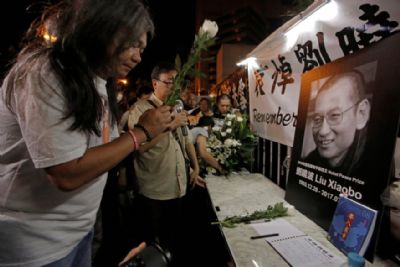Imprisoned for the last eight years of his life, his name erased from Chinese news reports and public records, Liu Xiaobo was a deliberately silenced man. But the Nobel Peace Prize laureate's death from liver cancer Thursday only intensified the public outcry over the causes he devoted his life to, as scholars, activists and governments around the world condemned Beijing for its treatment of the 61-year-old dissident.
U.S. lawmakers, human rights groups and democracy activists in China itself all weighed in on Mr. Liu's death, China's most famous political prisoner who succumbed quickly to his disease just weeks after his release from prison. The death also comes as the government of President Xi Jinping has made a conscious effort to boost China's "soft power" with such initiatives as the One Belt, One Road program and the new Asian Infrastructure Investment Bank.
Sen. Marco Rubio was one of a number of lawmakers on Capitol Hill sharply critical of Beijing's treatment of Mr. Liu.
"There should be an independent investigation into the circumstances surrounding Dr. Liu's death, his treatment in detention, the timing of the diagnosis of his late-stage liver cancer, and countless other questions that need to be answered," the Florida Republican said in a statement. "The Chinese authorities complicit in his unjust imprisonment and death should be immediately sanctioned and their assets frozen under" U.S. laws, he said.
President Trump, in a White House statement released Thursday evening, said he was "deeply saddened" by Mr. Liu's death, calling him a "political prisoner" who "dedicated his life to the pursuit of democracy and liberty."
Mr. Trump did not directly refer to China's treatment of Mr. Liu, but the White House earlier this week had called on Beijing to end the confinement for both Mr. Liu and his wife, so the ailing dissident could pursue the medical care of his choosing.
July 13, 2017
Liu Xiaobo's death creates public outcry against China
Date
July 13, 2017
Title
Liu Xiaobo’s death creates public outcry against China,
Washington Times
Author(s)
Nicole Ault
Original Source

